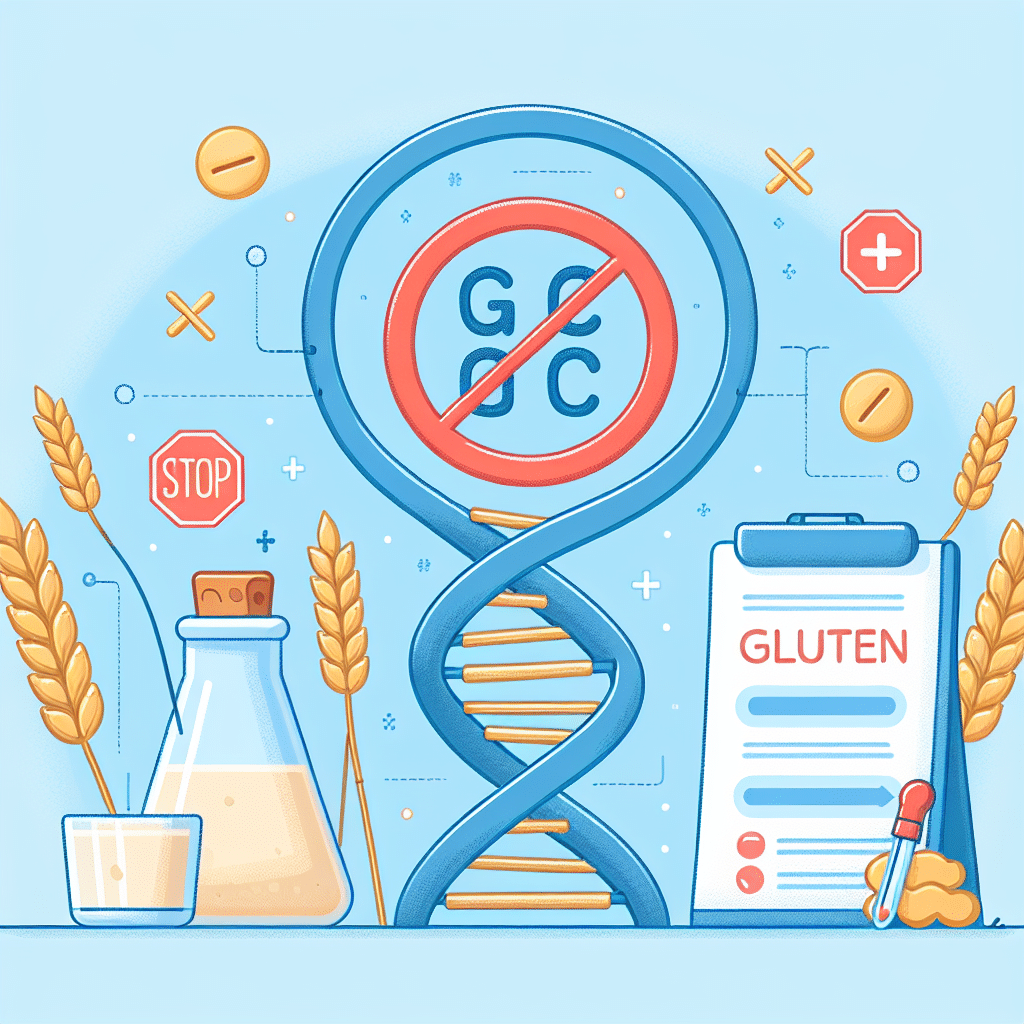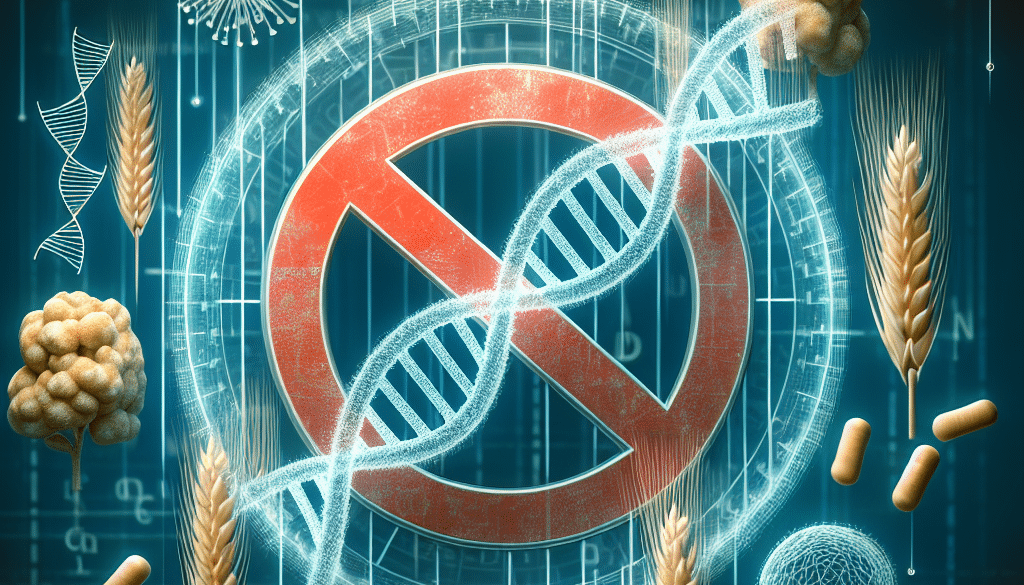What Gene Is Gluten Intolerance?
-
Table of Contents
- Gluten Intolerance and the Genetic Link: Understanding the Role of Genes
- The Genetics of Gluten Intolerance
- HLA Genes and Gluten Intolerance
- Non-HLA Genes and Gluten Intolerance
- Understanding Gluten Intolerance Symptoms and Diagnosis
- Case Studies and Population Statistics
- Living with Gluten Intolerance: Dietary Management
- Future Research Directions
- Conclusion: Key Takeaways on Gluten Intolerance Genetics
- Discover ETprotein’s Gluten-Free Protein Products
Gluten Intolerance and the Genetic Link: Understanding the Role of Genes

Gluten intolerance, also known as non-celiac gluten sensitivity (NCGS), is a condition that has garnered significant attention in the health and wellness community. Unlike celiac disease, which is a severe autoimmune disorder triggered by gluten, gluten intolerance involves a less clear-cut reaction to gluten-containing foods, leading to a range of gastrointestinal and systemic symptoms. This article delves into the genetic underpinnings of gluten intolerance, exploring what is currently known about the genes involved and their implications for individuals experiencing this condition.
The Genetics of Gluten Intolerance
While the exact cause of gluten intolerance is not fully understood, research suggests that genetics play a role in an individual’s susceptibility to the condition. Unlike celiac disease, which is strongly associated with specific human leukocyte antigen (HLA) genes, namely HLA-DQ2 and HLA-DQ8, the genetic landscape of gluten intolerance is more complex and less defined.
HLA Genes and Gluten Intolerance
Although not as strongly linked as in celiac disease, HLA genes may still contribute to gluten intolerance. Some individuals with gluten intolerance also carry the HLA-DQ2 or HLA-DQ8 genes, but these genes are not present in all cases. This suggests that other genetic factors are likely involved in the development of gluten intolerance.
Non-HLA Genes and Gluten Intolerance
Research is ongoing to identify non-HLA genes that may contribute to gluten intolerance. Studies have suggested that genes involved in the regulation of the immune system and inflammatory responses could be implicated. However, the evidence is still emerging, and no specific non-HLA genes have been definitively linked to gluten intolerance.
Understanding Gluten Intolerance Symptoms and Diagnosis
Gluten intolerance manifests with a variety of symptoms that can range from mild to severe. Common symptoms include abdominal pain, bloating, diarrhea, constipation, headaches, fatigue, and skin rashes. Unlike celiac disease, gluten intolerance does not cause damage to the small intestine.
Diagnosing gluten intolerance is challenging due to the lack of specific biomarkers. It is often diagnosed by ruling out celiac disease and wheat allergy and observing symptom improvement on a gluten-free diet.
Case Studies and Population Statistics
Case studies have shown that individuals with gluten intolerance can experience significant improvements in symptoms when following a gluten-free diet. Population statistics indicate that gluten intolerance is more common than celiac disease, affecting a larger percentage of the population, though exact numbers are difficult to determine due to diagnostic challenges.
Living with Gluten Intolerance: Dietary Management
For those with gluten intolerance, adhering to a gluten-free diet is the primary method of managing symptoms. This involves the elimination of foods containing wheat, barley, and rye. Gluten-free alternatives are increasingly available, making dietary management more accessible.
Future Research Directions
Future research aims to better understand the genetic factors contributing to gluten intolerance. Identifying specific genes may lead to improved diagnostic methods and personalized treatment approaches.
Conclusion: Key Takeaways on Gluten Intolerance Genetics
- Gluten intolerance is a condition with a genetic component, though less well-defined than celiac disease.
- HLA-DQ2 and HLA-DQ8 genes may be involved, but their presence is not as predictive as in celiac disease.
- Non-HLA genes related to immune system regulation are potential areas of interest for future research.
- Diagnosis of gluten intolerance is currently based on symptom relief following a gluten-free diet.
- Adhering to a gluten-free diet is the main strategy for managing gluten intolerance symptoms.
In summary, while the genetic basis of gluten intolerance is not as clear as that of celiac disease, there is evidence to suggest that genetics play a role. Understanding these genetic factors is crucial for improving diagnosis and treatment. As research progresses, we may gain a clearer picture of the genetic landscape of gluten intolerance, leading to better outcomes for those affected.
Discover ETprotein’s Gluten-Free Protein Products
If you’re managing gluten intolerance and looking for high-quality protein sources that align with your dietary needs, ETprotein offers a range of organic, gluten-free protein powders. Their products are non-GMO and allergen-free, ensuring that you can maintain your health without compromising on nutrition.
ETprotein’s selection includes organic rice protein, pea protein, and various seed-based proteins, all characterized by a neutral taste and high purity. These protein powders are ideal for individuals with gluten intolerance, providing a safe and effective way to support your dietary protein intake.
For more information on ETprotein’s offerings or to sample their products, reach out to them at sales(at)ETprotein.com.
About ETprotein:
ETprotein, a reputable protein and L-(+)-Ergothioneine (EGT) Chinese factory manufacturer and supplier, is renowned for producing, stocking, exporting, and delivering the highest quality organic bulk vegan proteins and L-(+)-Ergothioneine. They include Organic rice protein, clear rice protein, pea protein, clear pea protein, watermelon seed protein, pumpkin seed protein, sunflower seed protein, mung bean protein, peanut protein, and L-(+)-Ergothioneine EGT Pharmaceutical grade, L-(+)-Ergothioneine EGT food grade, L-(+)-Ergothioneine EGT cosmetic grade, L-(+)-Ergothioneine EGT reference grade and L-(+)-Ergothioneine EGT standard. Their offerings, characterized by a neutral taste, non-GMO, allergen-free attributes, with L-(+)-Ergothioneine purity over 98%, 99%, cater to a diverse range of industries. They serve nutraceutical, pharmaceutical, cosmeceutical, veterinary, as well as food and beverage finished product distributors, traders, and manufacturers across Europe, USA, Canada, Australia, Thailand, Japan, Korea, Brazil, and Chile, among others.
ETprotein specialization includes exporting and delivering tailor-made protein powder and finished nutritional supplements. Their extensive product range covers sectors like Food and Beverage, Sports Nutrition, Weight Management, Dietary Supplements, Health and Wellness Products, and Infant Formula, ensuring comprehensive solutions to meet all your protein needs.
As a trusted company by leading global food and beverage brands and Fortune 500 companies, ETprotein reinforces China’s reputation in the global arena. For more information or to sample their products, please contact them and email sales(at)ETprotein.com today.














